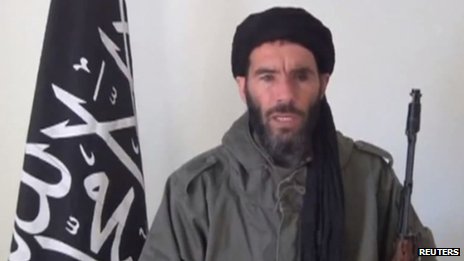
Hot Issue: Was the Attack on Algerian Oil Facilities a Symptom of AQIM In-Fighting?
By:

The hostage crisis at the gas plant facilities near In Aménas, in southeastern Algeria, ended on Thursday with major losses. Among the dozens of the dead or injured were Western as well as local Algerian workers, Islamist kidnappers and Algerian troops.
It may still be too early to make a detailed analysis of what has happened in this part of the supposedly well-secured area of the Algerian desert. However, the bold attack against the gas facility clearly shows that Mokhtar Belmokhtar, whose own group led the raid and held the hostages, is not content with being sidelined by the amir of al-Qaeda in the Islamic Maghreb (AQIM), Abdelmalek Droukdel (Abu Musab Abdel Wadoud). Belmokhtar launched the major attack against the oil industry inside Algeria in retaliation, to prove that he is capable of doing what his former “boss” was never able to do during his reign (since 2005).
Mokhtar Belmokhtar
Belmokhtar emerged in the limelight again as a result of the hostage crisis, showing himself as one of the main Islamist players in the Sahel region, despite his reported fall-out with Droukdel, the amir of AQIM (al-Hayat, 16 October 2012).
Belmokhtar is considered one of the “old guards” of the Algerian militant movement. After fighting in the Afghan Jihad in the early 1990s, he went back to his own country and joined the Armed Islamic Group (GIA) that was trying to topple the Algerian government that had cancelled elections won by an Islamic party in 1992. The GIA was defeated, however, by the Algerian government forces in the second half of the 1990s, and Belmokhtar jumped the sinking ship to join a splinter group called the Salafist Group for Preaching and Combat (GSPC) and became one of its top leaders in the Sahara Zone (southern Algeria).
Belmokhtar’s role in the Sahara gave him a chance to show how important the Sahel region could be to the Algerian militants, especially when they were being chased out from their traditional hideouts in the mountains of Algeria. In the vast Sahara in the Sahel countries bordering Algeria, Belmokhtar’s men found that they could easily move from one place to another without fear of being arrested by a strong military regime, such as the one they were facing further north in Algeria, as well as in neighboring Libya and Tunisia, which were still under the dictatorship of Qaddafi and Bin Ali. In the Sahel, Belmokhtar took advantage of the weak, corrupt governments and started to build bases for his men.
Belmokhtar played another important role in the Sahel; he can be credited with the “discovery” of a money-making machine: ransom-for-money. This came into being in 2003 when a group of GSPC militants, which included Belmokhtar, was crossing the Algerian Sahara and encountered a group of primarily German tourists. They were taken hostage and, with the exception of a German woman who died during the ordeal, all were freed for a hefty ransom, which was used to buy weapons according to Algerian press reports at the time. That incident was the first major kidnapping of Western nationals and it proved to the militants that at least some Western governments were willing to pay millions of dollars in order to secure the release of their citizens.
Despite all these “achievements,” Belmokhtar’s relationship with the leaders of the GSPC in Algeria deteriorated. The estrangement may have been a result of the physical distance between them as well as their polar circumstances; while Belmokhtar was regarded like a king among his loyal men roaming the Sahel in northern Mali, the leaders of the GSPC were under constant pressure from the Algerian government forces in the mountains of the Kabylie region, east of Algiers. The death of the GSPC amir Nabil Sahraoui in 2005 may have further complicated relations between Belmokhtar and the leaders of his own group because Belmokhtar thought of himself as a major candidate to replace Sahraoui but the position went to Droukdel instead.
Under Droukdel, the GSPC changed its name to al-Qaeda in the Islamic Maghreb (AQIM), in January 2007. Belmokhtar is believed not to have had any objections to the name change, but it was unclear whether he agreed with the group’s tactics. It is unclear, for example, what role he played between 2007 and 2008 when AQIM launched a series of suicide attacks against Algerian and foreign targets, killing scores of people. Algerian press reports claimed many times that Belmokhtar was in fact in secret negotiations with the government to stop the fight and join peace efforts underway at the time.
It is unknown if these reports of secret talks made the leaders of AQIM mistrust Belmokhtar, however, it was evident that Droukdel sought to curtail Belmokhtar’s powers by appointing men loyal to him to lead various groups operating under the banner of AQIM in the Sahel. Belmokhtar’s reply was to keep quiet and continue operating among his own group of followers in the al-Moulathamoun battalion (Those Who Cover Their Faces). He also participated in the business of kidnapping foreigners for ransom (one of those held by him was the Canadian diplomat, former UN Niger envoy Robert Fowler).
Belmokhtar showed little respect to the leaders of AQIM in Algiers; he was now operating independently, despite the fact that he was still part of AQIM in the Sahel. For instance, he is reported to have visited Libya after the fall of Qaddafi’s regime late in 2011 (Algerie360, March 13, 2012). Belmokhtar even said publicly that weapons from Qaddafi’s arsenal have reached the Islamists in the Sahel (www.djazairess.com/eldjadida/15905).
In September 2012, one of the top leaders of AQIM in Mali, Nabil Makhloufi, died in a car accident. Abu Musab then issued orders to strip Belmokhtar of any powers he still enjoyed and appointed another Algerian, Abu Hammam, to head the top AQIM post in Mali (al-Hayat, October 16, 2012).
Belmokhtar wasted no time in showing his defiance. He launched his own group in December 2012, Those Who Sign in Blood battalion, which threatened to attack countries involved with preparing a military campaign to expel Islamic militants and Tuareg nationalists controlling northern Mali since the spring of 2012, following a military coup that toppled the Malian president.
Belmokhtar’s threat against the West included two specific points:
- Attacks will be carried against the “heart” of these countries planning to attack northern Mali; and
- Attacks will be carried out against the interests of these countries.
The threat materialized before long; a group of militants loyal to Belmokhtar, led by a man called Abu al-Bara’, crossed into Algeria and attacked a gas facility in In Aménas on January 16, near the border with Libya. The Algerian authorities initially said the militants did not come from Libya, but changed their story after as the militants began freeing the hostages. Now the Algerian officials not only say that the militants crossed from Libya, but go as far as saying that the whole attack was planned in that country (Echorouk, January 17).
Algerian press reports say that at least two of the kidnappers were talking in a Libyan dialect, whereas most of the others spoke with a Tuareg accent (Fughas tribe) (Elkhabar, January 18). Whether or not the group did in fact come from Libya will be answered during the post-hostage investigation. But what is clear is that Libya in general and its south in particular are witnessing an alarming rise in violence. The Libyan authorities highlighted this issue in December last year when it declared the whole south of the country a military zone and closed its borders with its neighbors, including Algeria.
Belmokhtar may have planned the attack from Libya, as the Algerian interior minister Dahou Wild Qabliya is reported to have said, but his decision to attack the gas facility in Algeria also shows a degree of boldness or even willingness to challenge Droukdel in his own territory: Algeria. The attack and the taking of the hostages showed that it was Belmokhtar and not Droukdel who was quickest to step into the defense of the Islamists in northern Mali.
It is not clear if Belmokhtar attempted to seek permission to launch this attack in Algeria from Droukdel. However, this is not likely to be the case considering the quarrel last year between the two men. If Droukdel sees Belmokhtar’s attack inside Algeria as a challenge to his own authority, it will be interesting to see how he reacts. Launching an attack inside Algeria could be seen as a challenge to Droukdel’s authority, exactly as he himself did to Belmokhtar when he appointed his men to top positions in the Sahel without any regard to Belmokhtar’s history and connections there. From a religious point of view, however, Droukdel cannot and will not prevent Belmokhtar from helping the Islamists in northern Mali by applying pressure to stop the French attacks there.
The Algerian government may now be licking its wounded pride after having seen its oil industry attacked, but the attack in In Aménas has also shown that Belmokhtar is the rising star among the Islamists in the Sahel. Can Droukdel contain him this time? It is a question the amir of AQIM will have to answer, and soon.




